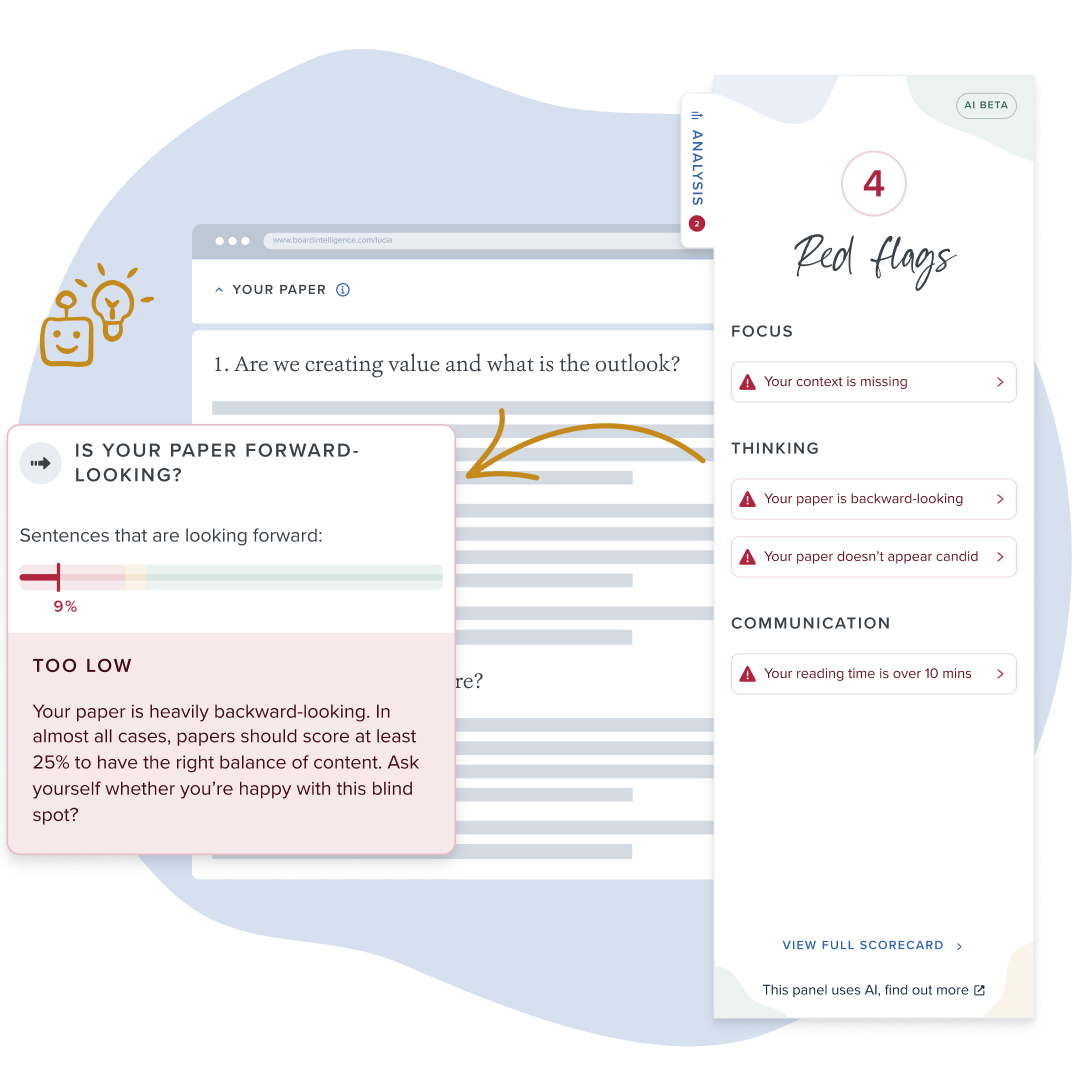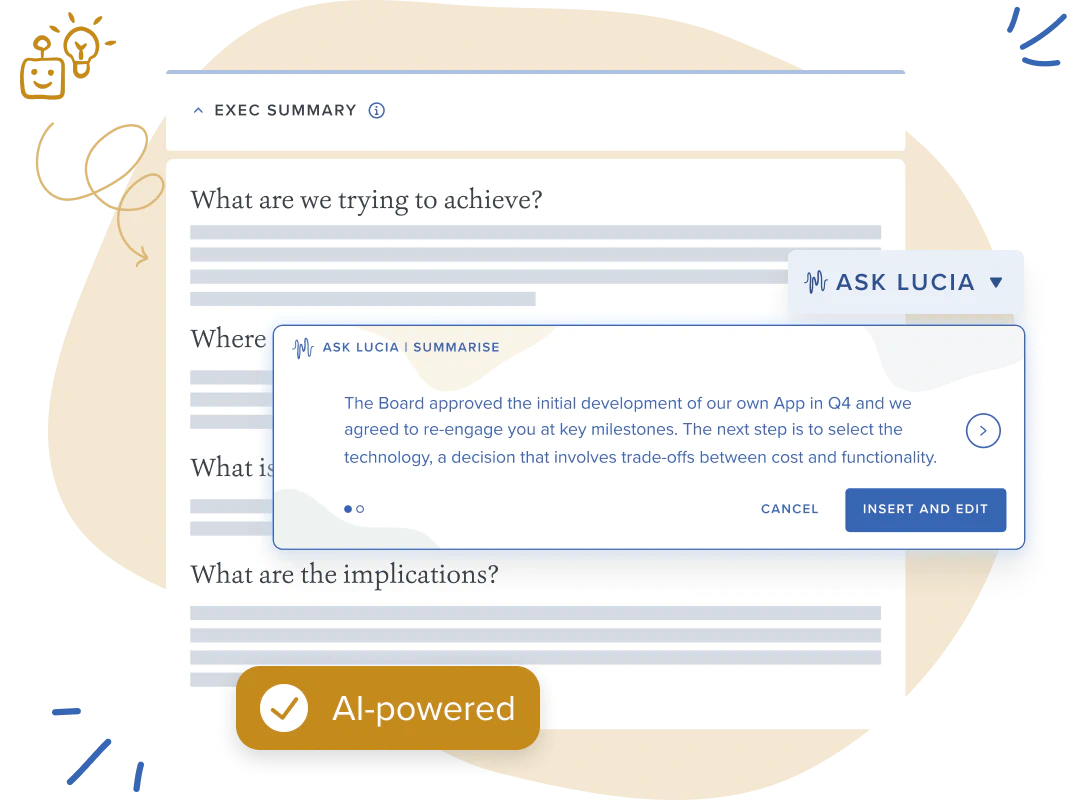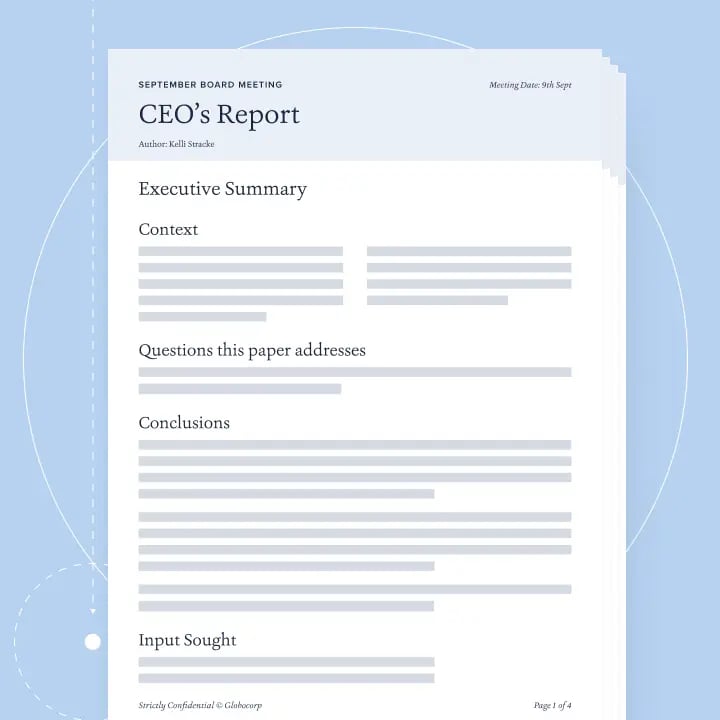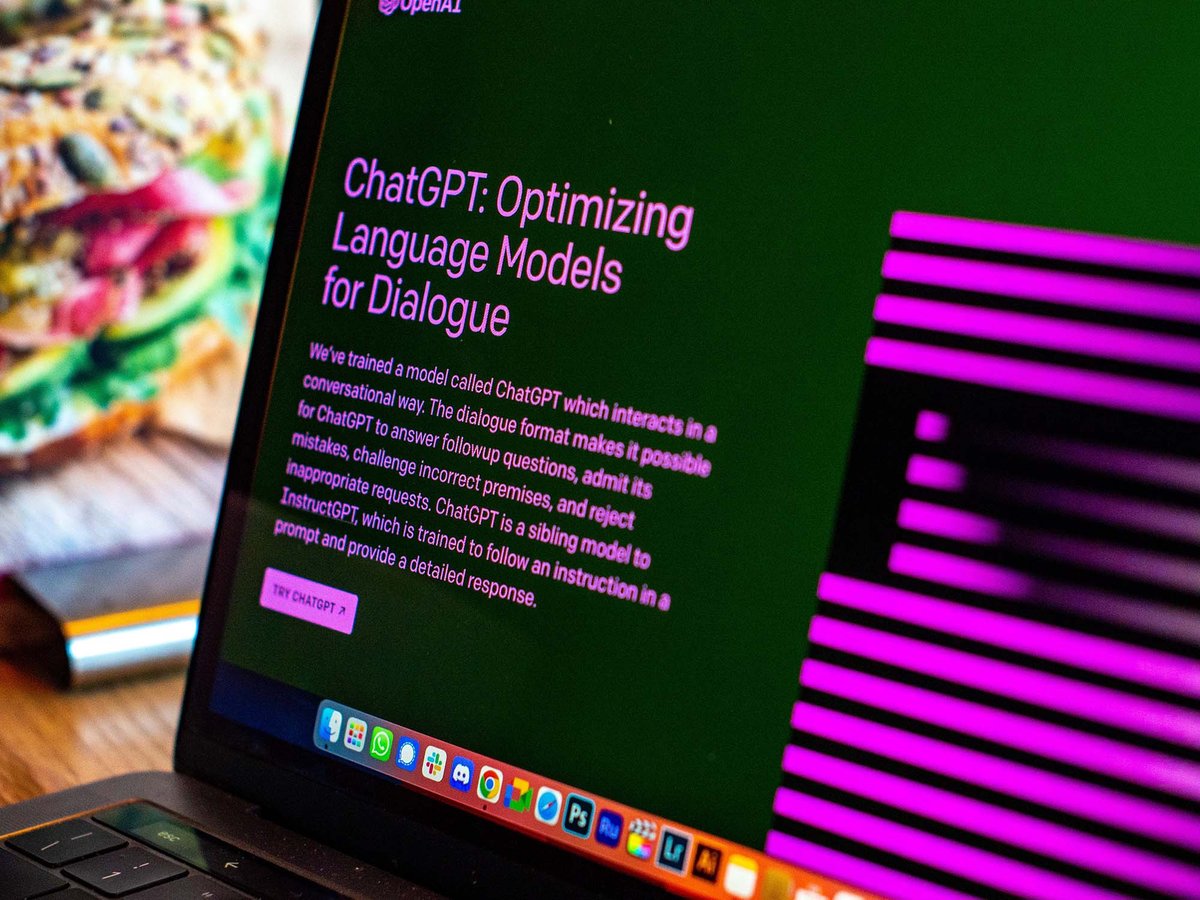Key takeaways:
- AI is unreliable for critical tasks as it lacks context and poses security risks.
- Use AI as an editor, not an author, to enhance human work.
- Human oversight is non-negotiable; always verify AI outputs for accuracy and bias.
- Specialized tools like Lucia from Board Intelligence offer real-time feedback, auto-summaries, and secure workflows.
- Organizations must train teams and standardize usage to ensure responsible AI adoption in board reporting.
The Reality of AI in Board Pack Creation: Opportunities and Limitations
AI can assist in creating board packs, but it can’t lead. While AI has powerful capabilities, the risks of security breaches and inaccuracies are unavoidable. Human expertise and secure tools are essential.
Why does ChatGPT's co-founder warn against over-reliance on AI?
OpenAI co-founder Sam Altman described ChatGPT as being “incredibly limited, but good enough… to create a misleading impression of greatness. It’s a mistake to be relying on it for anything important.”
ChatGPT is incredibly limited, but good enough at some things to create a misleading impression of greatness.
— Sam Altman (@sama) December 11, 2022
it's a mistake to be relying on it for anything important right now. it’s a preview of progress; we have lots of work to do on robustness and truthfulness.
Why would the founder of this hugely successful AI tool put such a caveat around his work? What does this tell us about using AI to create a board pack, which is potentially the most important document within an organization, and one that requires thoughtful input from its writers?
The fact is that AI tools aren’t as “smart” as they seem at first glance. Yes, they may be good at putting words together, but they have no conscious reasoning, moral compass, or even a way to distinguish between truths and lies. All they actually do is aggregate words in a way that’s statistically likely to be correct.
100 million users vs. security risks: What is the AI adoption paradox?
Modern AI tools are definitely proving themselves useful. Over 100 million people worldwide have now used ChatGPT, and the emergence of many new AI assistants seems to have the potential to infiltrate nearly every area of working life.
However, there are still limitations and risks to consider. The “AI adoption paradox” refers to the tension many organizations face when deciding whether (and how) to adopt artificial intelligence.
- High potential benefits vs. high uncertainty/risks: Businesses know that AI can boost efficiency, reduce costs, and unlock innovation. But they also worry about risks such as bias, lack of transparency, ethical concerns, regulatory scrutiny, and job displacement.
- Pressure to adopt vs. lack of readiness: Companies feel pressure to adopt AI to stay competitive, but many currently lack the infrastructure, skilled talent, or clear strategy to implement it effectively.
- Strategic importance vs. practical barriers: Leaders typically see AI as being essential for long-term growth, but struggle with short-term challenges like high costs, integration with legacy systems, and difficulty measuring ROI.
In short, organizations recognize that not adopting AI could leave them behind, but adopting it without the right foundations could lead to significant risks.
Real-world consequences: What happens when AI gets board information wrong?
Relying on AI to automate and author your board pack would be misguided. First, asking ChatGPT to write your papers would breach most companies’ information security policies. Additionally, the AI wouldn’t know the context, understand the issues at stake, or be able to verify the accuracy of the content it produces.
This isn’t a hypothetical scenario. When AI gets things wrong, it has real-life consequences. For example:
- If an AI tool misrepresents market data, competitor analysis, or financial trends, the board could set the wrong priorities or allocate resources poorly.
- Acting on inaccurate AI-generated data could expose the organization to liability.
- Misreporting compliance, ESG, or risk data could cause regulatory breaches or reputational harm.
- Biased or flawed algorithms could skew reporting, leading to unethical or inequitable damage.
Can AI write board reports? Understanding the risks and limitations
While AI can be a powerful tool in helping you create a board report, it can’t write an accurate and impactful report from scratch. It’s important to know about the common pitfalls of using AI and how best to mitigate them.
Information security concerns with public AI tools
Using public AI tools like ChatGPT for sensitive tasks poses numerous risks, including:
- Data leaks.
- Inadequate access controls.
- Exposure to cyber threats.
- Incorrect or misleading outputs.
An AI tool needs enterprise-grade authentication or user management, which helps organizations enforce the same security protocols as internal systems.
The context problem: Why can't AI understand board dynamics?
AI can analyze huge amounts of structured and unstructured data, but boardroom dynamics are a very human arena, and AI struggles to make sense of them.
Artificial intelligence:
- Doesn’t understand the nuances of human relationships.
- Can’t reliably interpret the informal signals that influence decision-making.
- Relies on explicit inputs and can’t interpret signals like silences or hesitations.
- Struggles to understand the specific culture of a board.
- Can’t authentically replicate emotional intelligence and values.
Case study: New York lawyers fined for AI-generated legal content
In 2023, two New York lawyers were fined $5,000 for relying on fake case citations made up by ChatGPT in a personal injury case. ChatGPT suggested numerous example cases that were fabricated, misidentified judges, or involved non-existent companies.
Judge P Kevin Castel noted that: “Technological advances are commonplace and there is nothing inherently improper about using a reliable artificial intelligence tool for assistance, but existing rules impose a gatekeeping role on attorneys to ensure the accuracy of their filings.”
How can you use AI for board reporting safely and effectively?
So, how can you use AI for board reporting in a safe, smart way? If you can’t trust AI to create something from scratch, you should rather use it to augment and improve what’s already there. While it can’t be an author, it can play the role of a critical guide and editor.
AI as editor vs. AI as author: The critical difference
While using AI as an author replaces the human voice, using it as an editor supports and strengthens the human voice.
AI as an author:
- Originates text, ideas, or narratives.
- Typically lacks deep context, lived experience, or authentic voice.
- Outputs may be generic or inaccurate.
- Readers may notice a lack of originality, depth, or human nuance.
AI as an editor:
- Enhances, reshapes, or polishes existing human-written content.
- Checks clarity, grammar, structure, and consistency.
- Suggests alternative phrasing where needed.
- Keeps the human voice while improving readability and precision.
Data privacy and security in AI-powered board tools
When it comes to data privacy and security, board tools are uniquely vulnerable.
Data privacy risks:
- Board packs often contain financials, strategy, executive pay, and legal matters. If AI mishandles or stores this data insecurely, a leak could be catastrophic.
- Even if data is “de-identified,” AI models may re-identify individuals or sensitive entities when cross-referenced with other datasets.
- Once data is uploaded to an AI system, ownership is unclear. Vendors may claim rights to use it for model training, creating legal and ethical concerns.
- AI vendors may process or store board data in multiple jurisdictions, raising compliance issues with GDPR, HIPAA, or local data residency laws.
Security risks:
- If role-based permissions aren’t enforced, directors or staff may access information they shouldn’t.
- Many AI tools integrate with cloud services or external APIs. Any weak link in a third party can expose board data.
- Hackers may try to extract sensitive information from AI models by querying them in certain ways (e.g., reconstructing confidential documents).
- AI systems may keep logs, training data, or cached outputs longer than boards realize, creating risks of unauthorized access later.
The Question Driven Insight (QDI) Principle for AI-enhanced reports
The Question Driven Insight (QDI) Principle is a methodology that builds three essential qualities into your papers:
- Focus on what matters: Ask and answer the most pertinent questions.
- Be rooted in critical thinking: Assure the reader that robust, intelligent analysis has been done.
- Communicate clearly and concisely: Share the key points in a way that’s easy for the reader to absorb.
This allows for the creation of AI-powered board reports without compromising the human intelligence needed in these reports.
AI-powered board reporting tools and features
Lucia, our board and management reporting platform, never shares or reuses your data. It’s the only AI-powered tool purpose-built for board and management reporting that doesn’t do so.
Lucia uses AI to help you consistently write high-impact, intelligent, and strategic reports. It’s based on the QDI Principle, meaning it encourages writers to focus on what matters, think critically, and communicate clearly.
Real-time feedback systems for board report writing
Lucia helps writers embed the QDI Principle into their board and management reports at scale, systemizing the approach and quality of papers organization-wide. The live analysis panel reviews your copy as you type, giving you a real-time update on how the report stacks up and how it could be improved.
Lucia can identify a paper's strengths and weaknesses, helping you craft a better and more intelligible board or management report.

Get live feedback and real-time prompts.
Identifying information-heavy vs. insight-light content
It can be difficult to share enough information without overwhelming the board with details. Lucia can flag instances where paragraphs are loaded with data but light on insight, and provide suggestions on how to improve the balance.
Balancing backward-looking analysis with forward strategy
Good reports look to the future and provide directors with the whole picture. Lucia can detect whether a document is too focused on past matters and flag those that focus only on “good news” without mentioning setbacks or risks.
Managing report length and clarity
Using the QDI Principle, Lucia can analyze a paper for clarity and concise communication, flagging areas that are overly long and wordy.
Automated executive summary generation
Great papers start with a strong executive summary that answers the most important questions upfront. Lucia can help you here, too. It allows you to auto-create an executive summary, which you can then edit to ensure that it accurately reflects the paper and all its complexities.

Build your executive summary with just a few clicks.
Key questions upfront: AI-assisted summary creation
Lucia's Auto-Summarization feature significantly streamlines the creation of executive summaries. It intelligently extracts and highlights key insights from a full report, crafting concise, insight-rich executive summaries that surface the most critical information. This helps busy executives quickly grasp the main points without wading through dense content.
Editing and customizing AI-generated summaries
Always fact-check your summary first, then remove any jargon or generic statements. Ensure that the tone of voice matches that of your organization. By refining AI-generated content with strategic intent and human intelligence, you can turn a good summary into an excellent one.
Live analysis and quality assessment tools
Lucia and its AI tools can’t create the perfect board paper from scratch, but it can critique and guide you in preparing high-quality reports. It can bring a systemized, organization-wide approach to board reporting that’s difficult to do through training and templates alone. This, in turn, sets the board up for success, enabling directors to identify what matters faster, add more value, and discharge their duties to the best of their abilities.
What are best practices for AI-enhanced board reporting?
Standardization, training, and quality control are all important practices for implementing AI-enhanced board reports at your company.
Implementing organization-wide AI reporting standards
Establishing consistent AI reporting standards across the organization ensures that board materials are reliable, comparable, and compliant. By defining clear guidelines on data sources, formatting, and disclosure of AI-generated content, your company can maintain trust and transparency while avoiding fragmented or inconsistent reporting practices.
Training teams on AI-assisted board pack creation
Training staff on how to properly use AI tools used for board reporting helps them work more effectively and responsibly. Training should go beyond technical use and include understanding AI’s limits. This builds confidence while ensuring that AI enhances rather than compromises reporting quality.
Quality control and human oversight in AI-generated content
No matter how advanced the technology might be, human oversight is critical to safeguarding accuracy and context in board reporting. Fact-checking, peer reviews, and executive validation help catch errors or misinterpretations before materials reach the board. Balancing AI efficiency with human judgment protects decision-making integrity.
The future of AI in corporate governance
AI is set to become a powerful enabler of more informed, agile, and transparent corporate governance. AI tools will increasingly support directors in making better strategic decisions while streamlining administrative tasks. However, this future also depends on balancing innovation with accountability, ensuring that boards remain in control of how AI is used.
Emerging AI technologies for board reporting
Advancements in natural language processing, predictive analytics, and generative AI are changing the way board reports are created. These technologies can automate drafting, highlight key risks, and even generate scenario planning models. The challenge is to use these tools responsibly to enhance strategic judgment, not to replace it.
Regulatory considerations for AI in governance documents
As AI becomes more integrated into corporate reporting, regulators are increasingly scrutinizing its use. Issues such as data accuracy, transparency, and disclosure requirements will shape how organizations deploy AI in governance documents. Boards must anticipate evolving regulations and establish their own internal standards to ensure compliance.
Building board director AI literacy
To get the full benefit of AI, directors must be fluent in how the technology works and what its limitations are. Building AI literacy at the board level ensures directors can critically assess AI-generated insights, ask the right questions, and make informed decisions. This skill set is rapidly becoming a core competency for effective governance.
Curious to see how Lucia’s AI tools can support you in delivering better board or management papers? Find out more here.

A thinking and writing platform that helps you to write brilliantly clever and beautiful reports that surface breakthrough insights and spur your business to action.
Find out more


